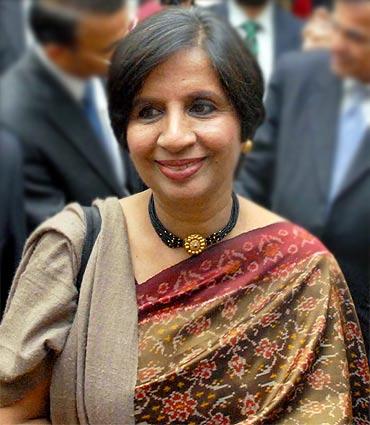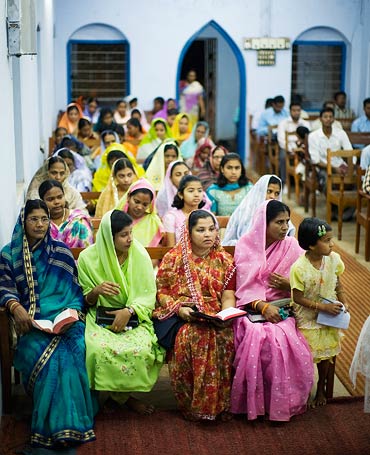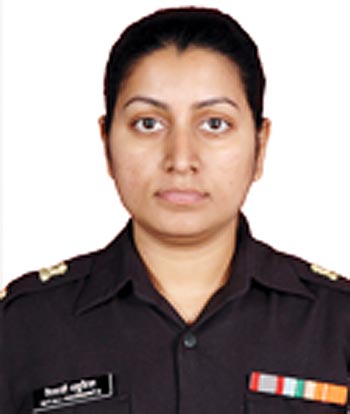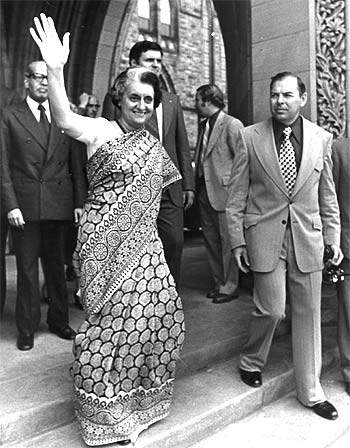 | « Back to article | Print this article |
'Indian women are challenging the glass ceiling'
We bring you edited excerpts from India's Foreign Secretary Nirupama Rao's keynote address on 'Women in Public Service' at the DRDO Workshop, on 'Worldwide Women's Leadership and Critical Success Factors for R&D'.
I am extremely pleased to be present here at the inaugural session of the workshop on 'Worldwide Women's Leadership and Critical Success Factors for Research and Development' organised by the Defence Research and Development Organisation (DRDO).
The country is proud of the contributions made by our scientists of the Defence Research and Development Organisation (DRDO).
The DRDO is a centre of national excellence with over 30,000 scientific and technical personnel, of which about 14% are women. It brings together our best scientific minds. I am confident that it will rise to the challenges of the future to make our nation truly proud of its achievements.
A few days back on 8 March, we celebrated the first centenary of the International Women's day. Debates on the level and progress in empowerment and advancement of women have been held regularly by the government, media and civil society alike.
When we consider the issue of women empowerment we realise that it commences from the basic unit of human life -- the family itself. The role of women in the family, their decision-making capabilities, the level of their education, respect for their rights and their dignity, care of their health are all building blocks or enablers for the larger role that they can play in a nation's development. It was Gandhiji who said that women are mentally, spiritually and intellectually, equals of men. That fundamental premise should guide our endeavour to permit the role and the space for women as equal partners in the progress India is making today.
Click NEXT to read more
'Barriers for women seeking elected office are not insurmountable'
Women in public service play an important part in bringing their voice and talent to shape the issues that guide our development. And as their voices become heard and their contributions acknowledged they can inspire their younger sisters to enter the workplace in even larger and larger numbers. Gender sensitivity in formulating policies that encourage the participation of women in public service, and in business and industry is a vital requirement in this process. Empowered and self-confident women serve as role models to many others who look upto them for inspiration and motivation. There is this multiplier effect as they become the driving force for many others.
There remain barriers for women seeking elected office or hoping to climb the ladder in the public service. But these barriers are not as high as many assume and are certainly not insurmountable. The government has also taken a number of measures to address discrimination against women, strengthen existing institutions which include the legal system, provide better access to education, health care and other services, equal opportunities for women's participation in decision-making, and mainstreaming gender concerns in the development process, etc.
With the amendments to the Constitution allowing for political empowerment of women through 33% reservation of women in rural and urban local bodies, there are today more than one million elected women representatives in panchayats in India. Another bill, already passed by Rajya Sabha, is presently under consideration of Lok Sabha, and if passed, will provide 33% reservation for women in parliament and state legislatures, and will be a significant step in ensuring greater political participation of women at national level.
'No country or posting is considered out of bounds for a woman officer in the IFS'
I must also mention here the praise and admiration that has come the way of the all-female contingent of women police from India who were engaged in UN Peacekeeping Operations in Liberia. They have done the nation proud. I also recall the exemplary courage and selflessness shown by Major Mitali Madhumita, a serving officer of the Army Education Corps and the first woman to be awarded the Sena Medal for her gallantry during the terrible attack by Taliban terrorists on a guest house in Kabul in February 2010 in which nineteen persons including seven Indians were killed and when she rescued several injured comrades.
Right from the times of Ms. C.B Muthamma, whose brilliance shone right through her work and who we all fondly remember as the first woman career diplomat of India, the history of women in the Indian civil services is replete with inspirational accounts of women who performed to the best of their abilities with steadfast commitment and dedication. Their life stories tell how they brought about transformational change both at home and abroad and when we remember their contribution to this nation, we do so with a sense of immense pride and respect.
Today, women comprise almost 11-12 per cent of the Indian Foreign Service. This increase is reflected not only in numbers but also in career profile and service conditions. Today there is no country or posting which is considered out of bounds for a woman officer in the Foreign Service. Coincidentally, the two most recent cases of evacuation of Indian nationals from Libya this year and Lebanon in 2008 were very ably handled by women Ambassadors.
'It'll reflect well on India's democracy to allow its women a greater voice in the times to come'
A greater participation by women in the civil service would definitely bring in the much needed balance in terms of gender representation. When women increasingly participate in the execution and implementation of issues of concern to them, and to the nation both at home and abroad, they become agents of change and transformation. They will inspire others to join in and replicate such efforts. This will be the touchstone of gender empowerment in the true sense of the term. It will reflect well on India's democracy to allow its women an even greater voice in the times to come.
Turning to the DRDO, I am aware of the stellar contributions being made, by our women scientists who are joining the Organisation in larger numbers. The role of women in science is to be particularly prized and celebrated because they are pioneers in every sense -- innovators, inventors, and initiators of new paths and areas of scientific development and discovery -- whether in basic research, life sciences, aeronautics, computer science and armaments and missile technologies. The nation salutes their achievements.
I will conclude by quoting our former Prime Minister Smt. Indira Gandhi who said that 'to be liberated, woman must feel free to be herself, not in rivalry to man but in the context of her own capacity and her personality. We need women to be more interested, more alive and more active not because they are women but because they do comprise half the human race. Whether they like it or not, they cannot escape their responsibility nor should they be denied its benefits'.
I wish you all happiness, and higher and higher achievement, in your efforts to build a modern, progressive and developed India. Thank you



